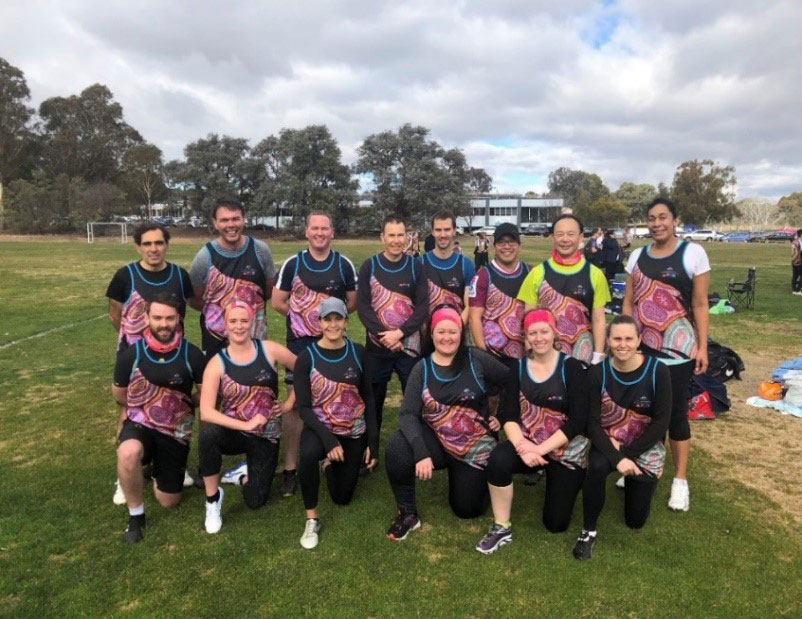Aboriginal and/or Torres Strait Islander peoples should be aware that this website may contain the names and images of people who have passed away.
Download print version
Office of the Pacific - Indigenous Engagement Plan 2021-23 [PDF 3.5 MB]
On this page
Acknowledgement
The Department of Foreign Affairs and Trade acknowledges Aboriginal and Torres Strait Islander peoples as the First peoples of Australia and recognises their contributions to the Department’s representation of Australia to the world.
Artist Acknowledgement
The Artist - Maggie-Jean Douglas
Maggie-Jean Douglas is a descendant of the Gubbi Gubbi people from the Sunshine Coast region and a proud member of the Australian South Sea Islander community. She is currently living and working in Canberra on Ngunnawal and Ngambri country and feels grateful to be able to do so. Her cultural heritage is something she is extremely proud of. She hopes her artworks have a positive impact on those who view and engage with her art.
Title
‘Australia, the Pacific Islands and their people’
Artwork statement
This artwork represents Australia and the countries throughout the Pacific Ocean and their connection to one another. I wanted the finished artwork to create a celebration of both their connection to each other and their connection to the land and sea; as well as the diversity between Australia and the Pacific.
Intellectual Property
The intellectual property for this artwork remains with the Artist, Maggie-Jean Douglas. This artwork should not be replicated or used for another purpose without the appropriate approvals
Head of the Office of the Pacific Foreword
The Office of the Pacific was established in the Department of Foreign Affairs and Trade to support Australia's deepening engagement with the Pacific. As Head of the Office of the Pacific, I coordinate our whole-of-government efforts to build stronger relationships with Pacific leaders, governments and peoples, as well as with regional organisations and institutions.
The rich and distinct culture of Indigenous Australia resonates deeply with Pacific Islander people. In sharing this culture with Pacific people through our diplomatic engagement, it is paramount that we are working collaboratively with Indigenous Australians, to portray an accurate and authentic representation.
This Indigenous Engagement Plan aims to guide efforts by the Office of the Pacific to support deeper and more direct engagement between Indigenous Australians and Pacific Islander people, as well as to embed Indigenous perspectives in the strategic and diplomatic work of the Office of the Pacific.
Introduction
The Department of Foreign Affairs and Trade acknowledges and values Aboriginal and Torres Strait Islander (Indigenous) cultures and heritage as a part of our national identity(1). Indigenous Australian and Pacific Islander peoples share long-standing cultural and family connections. The Office of the Pacific (OTP) extends this acknowledgement to the Australian South Sea Islander community, who share these connections and are recognised as a distinct cultural group in Australia(2).
In 2016, the Pacific Division (now OTP) developed the ‘Engaging Indigenous Australia in the Pacific’ policy. This policy sought to leverage these cultural connections to strengthen Australia’s relationships with the Pacific. To further this work, the OTP has developed an Indigenous Engagement Plan (IEP).
The IEP has three key objectives, which will guide and inform the delivery of activities. Through the objectives, the IEP aims to respond to the strong interest from the region for greater engagement with, and representation of, Indigenous Australian peoples and perspectives(3). These objectives are -
- Embedding Indigenous Australian and Australian South Sea Islander peoples, businesses and perspectives in the delivery of the Pacific Step Up.
- Increased representation of Indigenous and Australian South Sea Islander peoples in the OTP and at Posts
- Increased investment in the cultural awareness and capability of OTP staff.
The 2017 Foreign Policy White Paper(4) sets out Australia's highest foreign policy priorities, including a commitment to step up our engagement in the Pacific. The OTP recognises its position as the lead coordinating body for whole-of-government engagement in the Pacific; and the responsibility shared across government to implement the Pacific Step Up.
The OTP will seek to leverage this position by encouraging greater coordination of efforts with whole-of-government partners both in the region, and domestically. In particular, the IEP will be a key contributor to strengthening our people-to-people linkages in the Pacific.
The IEP will be reviewed in 2022, to ensure it remains fit for purpose.
NAIDOC 2019 APS Touch Football Carnival
Colleagues from the Office of the Pacific participating in the 2019 NAIDOC touch football competition alongside the former Indigenous Champion (Richard Maude) and members of the Indigenous Employees Network.
The APSC hosts this increasingly popular event annually during NAIDOC week. Government departments are encouraged to enter a team each year to celebrate diversity and promote understanding and respect among Indigenous and non-Indigenous APS employees.
Strategic Linkages
The IEP will support the delivery of activities and outcomes across a number of key policies, including the -
- Indigenous Procurement Policy (IPP). The IPP is a Commonwealth-level policy, which seeks to drive demand for Indigenous goods and services, stimulate Indigenous economic development and grow the Indigenous business sector. The IEP will invigorate the OTP’s application of the IPP by encouraging sections and posts to procure goods and services directly from Indigenous businesses and indirectly through larger managing contractors.
- DFAT Indigenous Peoples Strategy (IPS). The IPS seeks to elevate indigenous issues (beyond Aboriginal and Torres Strait Islander peoples) in the work of the department. The IEP will assist the implementation of Pillar two and three – integrating indigenous issues into the overseas aid program and our soft power initiatives in the Pacific.
- Stretch Reconciliation Action Plan (RAP). The RAP cements the department’s commitment to strengthening staff cultural competency, including in consolidating the skills required to represent, advocate for and promote Indigenous Australia, particularly in our work overseas. The three focus areas of the RAP are – Relationships, Respect and Opportunities.
- Diversity & Inclusion (D&I) Framework. The D&I Framework highlights the key priorities for all the diversity networks in DFAT. The IEP will encourage staff to consider opportunities of intersectionality across DFAT’s broader diversity and inclusion priorities, with a focus on Indigenous representation.
Communications
OTP staff are encouraged to identify opportunities to highlight OTP’s commitments in the IEP. This will include by posting on social media and using inclusive language in speeches, talking points and briefing papers. Staff are encouraged to consider the below messages when developing any DFAT communications that relate to Indigenous engagement.
- Australia’s Indigenous heritage is a fundamental element of this nation’s story. DFAT has been uniquely tasked with ‘taking Australia’ to the world.
- DFAT is committed to promoting Aboriginal and Torres Strait Islander peoples and cultures to the world, and providing opportunities to assist Indigenous peoples — both in Australia and overseas —to overcome social and economic disadvantages
Case Study: Ranger program in Papua New Guinea
Australia has supported remote communities in the South Fly District of PNG through a Ranger program for over five years. Adapted from a successful Indigenous Australian community ranger model, the program has built a cohort of 162 community rangers, of which 30% are women. It aims to empower female rangers by providing training to women as well as to men, including plumbing, building, sanitation, disaster response, first aid, well-digging and marine rescue. Consequently, female rangers have become role models for gender equality in village communities by undertaking tasks traditionally divided by gender roles.
In 2018 the PNG Ranger program sent two community rangers to an Indigenous Rangers Forum in Burketown, Australia, which brought together representatives of 72 ranger groups from all over northern Australia. This exchange of cultural knowledge provided an opportunity for the PNG rangers to both learn from Australian Indigenous ranger methods and showcase their own skills.
Cultural Working Group
The OTP has a Cultural Working Group which includes:
- Cultural Champion: An OTP SES officer will fill the Cultural Champion role. The Cultural Champion will advocate for the delivery of IEP outcomes and chair the Cultural Working Group.
- Divisional and Regional Champions: Divisional and Regional Champions will act as the point of contact for Divisions and/or Pacific Posts on issues relating to the IEP. They will also support monitoring and evaluation efforts. Each OTP Division Head is responsible for the identification of Divisional Champions.
- Indigenous Employee Network (IEN): As the department’s network for Aboriginal and Torres Strait Islander employees, the IEN will be encouraged to provide a representative at each working group meeting.
The key roles of the working group will include –
- Providing expertise and advice on Indigenous engagement and delivery of the IEP, with an awareness of the strategic, political and/or operational outcomes.
- Engaging with new and existing stakeholders and identify opportunities for collaboration.
- Developing and review draft reports, briefing papers, speeches and discussion papers
- Coordinating or supporting the delivery of events in celebration of Indigenous and Australian South Sea Islanders days of significance.
- Monitor and report on the implementation of OTP’s Indigenous priorities including through the Department’s Reconciliation Action Plan, OTP’s Divisional Business Plan, Indigenous Peoples Strategy.
Case Study: Melanesia Ecumenical Special Visit Program 2019
Australia has supported remote communities in the South Fly District of PNG through a Ranger program for over five years. Adapted from a successful Indigenous Australian community ranger model, the program has built a cohort of 162 community rangers, of which 30% are women. It aims to empower female rangers by training women to the same standard as men, including plumbing, building, sanitation, disaster response, first aid, well-digging and marine rescue. Consequently, female rangers have become role models for gender equality in village communities by undertaking tasks traditionally divided by gender roles.
In 2018 the PNG Ranger program sent two community rangers to an Indigenous Rangers Forum in Burketown, Australia, which brought together representatives of 72 ranger groups from all over northern Australia. This exchange of cultural knowledge provided an opportunity for the PNG rangers to both learn from Australian Indigenous ranger mehods and showcase their own skills.
(1) DFAT (2019), Stretch Reconciliation Action Plan
(2) Queensland Government (2000), Recognition Statement: Australian South Sea Islander Community
(3) Whitlam Institute (2020), Submission to JSCFADT inquiry into strengthening Australia’s relationships with countries in the Pacific region
(4) Australian Government (2017), 2017 Foreign Policy White Paper






